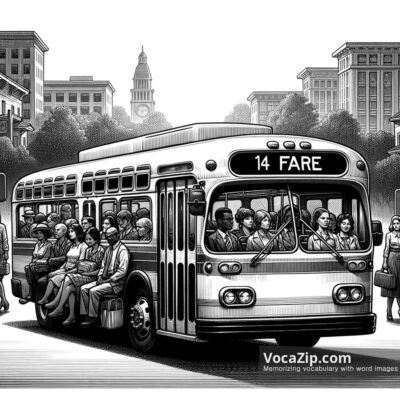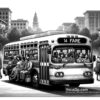fare meaning
fare :
travel cost, ticket price
noun
▪ The bus fare is $2.
▪ The bus ticket costs $2.
▪ He paid the train fare.
▪ He paid for the train ticket.
paraphrasing
▪ charge – travel cost
▪ fee – ticket price

fare :
to get along, to perform
verb
▪ She fared well in the test.
▪ She did well in the test.
▪ How did you fare at the meeting?
▪ How did you do at the meeting?
paraphrasing
▪ manage – to get along
▪ perform – to do
Pronunciation
fare [fɛər]
The stress is on the whole word and sounds like 'fair'.
Common phrases and grammar about fare
fare - Common meaning
noun
travel cost, ticket price
verb
to get along, to perform
Part of Speech Changes for "fare"
▪ fare (noun) – travel cost
▪ fared (verb) – performed or managed
Common Expressions with "fare"
▪ bus fare – bus travel cost
▪ train fare – train ticket price
▪ taxi fare – taxi travel cost
▪ airfare – plane ticket price
Important examples of fare in TOEIC
Vocabulary examples from the TOEIC test
In TOEIC vocabulary questions, fare often refers to the cost of travel by public transport.
Example of a confusing word: fair (just or equal)
Grammar examples from the TOEIC test
Fare is used as a noun for cost and as a verb for how someone does, often appearing in grammar questions.
fare
Idioms and fixed expressions in TOEIC
pay the fare
'pay the travel cost', used in transportation contexts.
fare well
means 'to do well', used to describe performance.
Differences between similar words and fare
fare
,
charge
differences
Fare is specifically for travel costs, while charge can be for any service or product.
fare
,
fee
differences
Fare is used for travel costs, while fee is used for services or memberships.
Words with the same origin as fare
The origin of fare
fare comes from the Old English 'faran', meaning 'to travel or go'.
Word structure
The word's composition is unclear, but it relates to travel or performance.
Words with the same origin
The word's root is unclear or difficult to confirm.
Please select an image in the quiz
Previous post and next post







